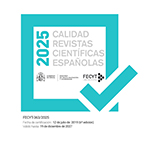Indicadores de Transición Ecosocial desde una perspectiva ecofeminista. Castilla-La Mancha como estudio de caso.
Resumen
Introducción. Las transiciones ecosociales, es decir aquellas que plantean modelos relacionales y de consumo circulares, solidarios, ecológicos, equitativos, feministas y en armonía con la naturaleza, entre otros atributos, son un sector en auge. Objetivos. Este estudio propone, desde la perspectiva del ecofeminismo, medir el funcionamiento interno de 55 proyectos de transición eco-social en la provincia de Castilla-La Mancha. Metodología. Para ello se realizó un censo con un total de 156 iniciativas, una muestra representativa del sector, del que recibimos respuesta por parte de 55, el equivalente a un 35,2% de la muestra. Como eje central metodológico se aplicó el Indicador de Transición Ecosocial (ITE), un valor de referencia elaborado a través de la cumplimentación de un cuestionario con preguntas cerradas que nos permite establecer rankings a través de ponderaciones validadas en las respuestas. La metodología se complementa con entrevistas semiestructuradas, de orden cualitativo, a un total de 16 fundadoras, directoras, socias o participantes en proyectos de ecotransición en Castilla-La Mancha. Nuestras preguntas de investigación son las siguientes: ¿existen mecanismos en la entidad que permiten a las mujeres conciliar el trabajo con otras necesidades? ¿La diversidad de géneros está presente en todos los ámbitos de poder o en la toma de decisiones? ¿En el seno de la entidad existe un reparto equitativo de las tareas? ¿En qué términos prácticos se aplica el ecofeminismo?. Resultados. Los resultados son positivos en cuanto a la presencia de mecanismos de conciliación, diversidad de géneros y reparto equitativo de tareas. Sin embargo, el estudio muestra que mientras algunas mujeres mujeres practican la economía basada en los principios ecofeministas con conocimiento de causa, otras muchas no tienen consciencia de estar haciéndolo, por desconocimiento o por errónea aproximación al concepto. Conclusiones y discusión. Es necesario expandir el concepto más allá de los círculos académicos, allá donde se está practicando
Descargas
Descarga artículo
Licencia
La revista Investigaciones Feministas, para fomentar el intercambio global del conocimiento, facilita el acceso sin restricciones a sus contenidos desde el momento de su publicación en la presente edición electrónica, y por eso es una revista de acceso abierto. Los originales publicados en esta revista son propiedad de la Universidad Complutense de Madrid y es obligatorio citar su procedencia en cualquier reproducción total o parcial. Todos los contenidos se distribuyen bajo una licencia de uso y distribución Creative Commons Reconocimiento 4.0 (CC BY 4.0). Esta circunstancia ha de hacerse constar expresamente de esta forma cuando sea necesario. Puede consultar la versión informativa y el texto legal de la licencia.











